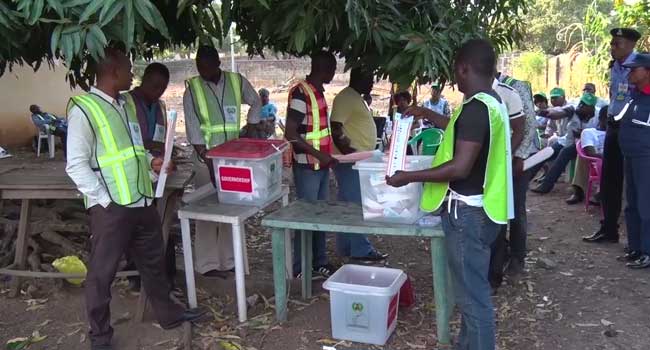Kemi Adeosun, minister of finance, has unveiled a 10-point agenda for driving growth from the fiscal side of the economy in 2017.
Adeosun, who represented Vice-President Yemi Osinbajo at the annual dinner of the Lagos Business School, presented a 10-point fiscal road map to “reset” the Nigerian economy to a path of growth.
Speaking at the session which was attended by industry leaders across key sectors of the economy including oil, banking and telecoms, Adeosun said “the federal government’s fiscal policy roadmap is addressing barriers to growth that will drive productivity, generate jobs and broaden wealth creating opportunities to achieve inclusive growth”.
She stated that the President Muhammadu Buhari administration is determined to tackle the infrastructure deficit to unlock productivity and will actively partner with the private sector to achieve this.
Advertisement
She said the ongoing economic transformation at the federal government level is being replicated at the state level.
Adeosun disclosed that many state governments have started looking inwards for additional sources of revenue.
Several states are also replicating the federal government’s efficiency unit initiative to rationalise expenditure and boost cost efficiency, she said.
Advertisement
Adeosun concluded her remarks by assuring that, despite the current economic challenges facing the Nigerian economy, the outlook is positive.
She reiterated that Government is determined to create an enabling environment and put in place supportive policies to return to growth in 2017.
Adeosun’s fiscal roadmap and 10-point plan for 2017
| S/N | Fiscal Policy Initiative | Expected Impact |
|---|---|---|
| 1 | Recognise inherited debt profile after a robust audit process:Introduce promissory note program to finance verified liabilities Issue debt certificates to contractors, Ministries, Departments & Agencies (MDAs), and State Governments |
Improve cash flow of businesses Improve Banks’ Non-Performing Loans (NPLs) Free up Banks’ balance sheet for lending to private sector Improve Government’s business interaction with the private sector |
| 2 | Mobilise private capital to complement Government spending on infrastructure: Roads Trust Fund Family Homes Fund Extend infrastructure tax relief to a collective model to attract clusters of corporate entities |
Expand the provision of infrastructure Drive growth of non-oil sector. Drive economic growth |
| 3 | Strengthen fiscal/monetary handshake: Replace administrative measures on list of 41-items with fiscal measures to reduce demand pressure in parallel market Encourage domestic food production through specific incentives e.g. accelerated depreciation on food manufacturing equipment and Zero (0%) duty on green houses Planned revitalisation of refineries Increase Diaspora remittances via participation in the buyer support scheme for the Family Homes Fund |
Reduce demand for US Dollars Increase supply of US Dollars |
| 4 | Incentivise exports: Restructure the Export Expansion Grant (EEG) to a tax credit system Rationalise tariffs and waivers in key export sectors |
Encourage/incentivise non-oil exports Drive import substitution |
| 5 | Encourage investment in specific sectors through fiscal incentives: Accelerated depreciation on equipment in strategic sectors e.g. food processing, mining and power Rationalise tariffs and waivers in priority sectors |
Drive investment in strategic sectors |
| 6 | Continue expansion of fiscal space through revenue enhancement and cost consolidation: Customs Single Window (being implemented through a Private Public Partnership (PPP) scheme) Template for non-allowable expenses for Government Agencies. Overhead cost control by the Efficiency Unit Continuous risk based audit by the Presidential Initiative on Continuous Audit |
Revenue enhancement Cost containment |
| 7 | Improve fiscal discipline at Sub-National level: Extension of efficiency unit at Sub-National level Fast track municipal bond issues to deepen the bond market Conversion to International Public Sector Accounting Standards by all State Governments. |
Improved fiscal position at Sub-National level |
| 8 | Enable and accelerate Recoveries process: Whistle-blower scheme Centralised database on recovered assets Asset tracing Professional management of recovered assets |
Increased efficiency of Recoveries processIncreased budgetary funding availability from Recoveries |
| 9 | Rebalance debt portfolio to extend maturity and optimise debt service cost: Rebalance public debt portfolio with increased external borrowing (60:40 target) Extend maturity profile of public debt portfolio Deploy long-term debt instruments including Infrastructure and Retail Bonds Maximise use of concessionary loans |
Rebalanced debt profile with improved debt service to revenue ratio |
| 10 | Catalyse Micro, Small and Medium Enterprise (MSME) growth through specific measures to improve capacity and access to finance: Development Bank of Nigeria (US$1.3bn) Increase share of business awarded to MSMEs from Government contracts Tax harmonisation and tax incentives Accelerated depreciation |
Acceleration of MSME growth |
Advertisement
1 comments








What a shoddy presentation; the proposed reset or 10 point agenda did not make any provision for monitoring it and experts adduced that what cannot be monitored cannot be measured. Madam minister!